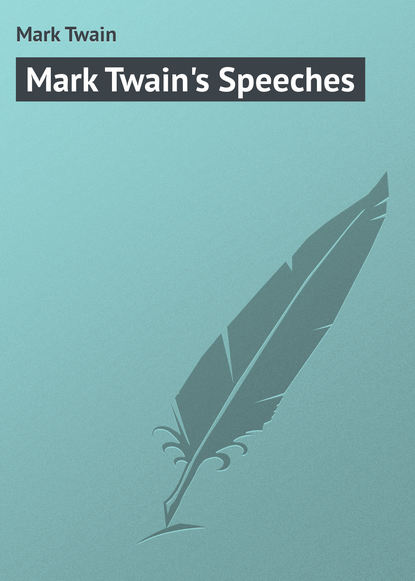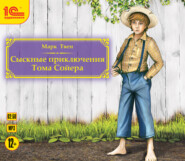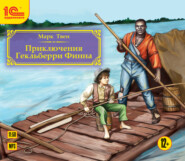По всем вопросам обращайтесь на: info@litportal.ru
(©) 2003-2025.
✖
Mark Twain's Speeches
Настройки чтения
Размер шрифта
Высота строк
Поля
I am curiously situated to-night. It so rarely happens that I am introduced by a humorist; I am generally introduced by a person of grave walk and carriage. That makes the proper background of gravity for brightness. I am going to alter to suit, and haply I may say some humorous things.
When you start with a blaze of sunshine and upburst of humor, when you begin with that, the proper office of humor is to reflect, to put you into that pensive mood of deep thought, to make you think of your sins, if you wish half an hour to fly. Humor makes me reflect now to-night, it sets the thinking machinery in motion. Always, when I am thinking, there come suggestions of what I am, and what we all are, and what we are coming to. A sermon comes from my lips always when I listen to a humorous speech.
I seize the opportunity to throw away frivolities, to say something to plant the seed, and make all better than when I came. In Mr. Grossmith’s remarks there was a subtle something suggesting my favorite theory of the difference between theoretical morals and practical morals. I try to instil practical morals in the place of theatrical – I mean theoretical; but as an addendum – an annex – something added to theoretical morals.
When your chairman said it was the first time he had ever taken the chair, he did not mean that he had not taken lots of other things; he attended my first lecture and took notes. This indicated the man’s disposition. There was nothing else flying round, so he took notes; he would have taken anything he could get.
I can bring a moral to bear here which shows the difference between theoretical morals and practical morals. Theoretical morals are the sort you get on your mother’s knee, in good books, and from the pulpit. You gather them in your head, and not in your heart; they are theory without practice. Without the assistance of practice to perfect them, it is difficult to teach a child to “be honest, don’t steal.”
I will teach you how it should be done, lead you into temptation, teach you how to steal, so that you may recognize when you have stolen and feel the proper pangs. It is no good going round and bragging you have never taken the chair.
As by the fires of experience, so by commission of crime, you learn real morals. Commit all the crimes, familiarize yourself with all sins, take them in rotation (there are only two or three thousand of them), stick to it, commit two or three every day, and by-and-by you will be proof against them. When you are through you will be proof against all sins and morally perfect. You will be vaccinated against every possible commission of them. This is the only way.
I will read you a written statement upon the subject that I wrote three years ago to read to the Sabbath-schools. [Here the lecturer turned his pockets out, but without success.] No! I have left it at home. Still, it was a mere statement of fact, illustrating the value of practical morals produced by the commission of crime.
It was in my boyhood just a statement of fact, reading is only more formal, merely facts, merely pathetic facts, which I can state so as to be understood. It relates to the first time I ever stole a watermelon; that is, I think it was the first time; anyway, it was right along there somewhere.
I stole it out of a farmer’s wagon while he was waiting on another customer. “Stole” is a harsh term. I withdrew – I retired that watermelon. I carried it to a secluded corner of a lumber-yard. I broke it open. It was green – the greenest watermelon raised in the valley that year.
The minute I saw it was green I was sorry, and began to reflect – reflection is the beginning of reform. If you don’t reflect when you commit a crime then that crime is of no use; it might just as well have been committed by some one else: You must reflect or the value is lost; you are not vaccinated against committing it again.
I began to reflect. I said to myself: “What ought a boy to do who has stolen a green watermelon? What would George Washington do, the father of his country, the only American who could not tell a lie? What would he do? There is only one right, high, noble thing for any boy to do who has stolen a watermelon of that class he must make restitution; he must restore that stolen property to its rightful owner.” I said I would do it when I made that good resolution. I felt it to be a noble, uplifting obligation. I rose up spiritually stronger and refreshed. I carried that watermelon back – what was left of it – and restored it to the farmer, and made him give me a ripe one in its place.
Now you see that this constant impact of crime upon crime protects you against further commission of crime. It builds you up. A man can’t become morally perfect by stealing one or a thousand green watermelons, but every little helps.
I was at a great school yesterday (St. Paul’s), where for four hundred years they have been busy with brains, and building up England by producing Pepys, Miltons, and Marlboroughs. Six hundred boys left to nothing in the world but theoretical morality. I wanted to become the professor of practical morality, but the high master was away, so I suppose I shall have to go on making my living the same old way – by adding practical to theoretical morality.
What are the glory that was Greece, the grandeur that was Rome, compared to the glory and grandeur and majesty of a perfected morality such as you see before you?
The New Vagabonds are old vagabonds (undergoing the old sort of reform). You drank my health; I hope I have not been unuseful. Take this system of morality to your hearts. Take it home to your neighbors and your graves, and I hope that it will be a long time before you arrive there.
Layman’s Sermon
The Young Men’s Christian Association asked Mr. Clemens to deliver a lay sermon at the Majestic Theatre, New York, March 4, 1906. More than five thousand young men tried to get into the theatre, and in a short time traffic was practically stopped in the adjacent streets. The police reserves had to be called out to thin the crowd. Doctor Fagnani had said something before about the police episode, and Mr. Clemens took it up.
I have been listening to what was said here, and there is in it a lesson of citizenship. You created the police, and you are responsible for them. One must pause, therefore, before criticising them too harshly. They are citizens, just as we are. A little of citizenship ought to be taught at the mother’s knee and in the nursery. Citizenship is what makes a republic; monarchies can get along without it. What keeps a republic on its legs is good citizenship.
Organization is necessary in all things. It is even necessary in reform. I was an organization myself once – for twelve hours. I was in Chicago a few years ago about to depart for New York. There were with me Mr. Osgood, a publisher, and a stenographer. I picked out a state-room on a train, the principal feature of which was that it contained the privilege of smoking. The train had started but a short time when the conductor came in and said that there had been a mistake made, and asked that we vacate the apartment. I refused, but when I went out on the platform Osgood and the stenographer agreed to accept a section. They were too modest.
Now, I am not modest. I was born modest, but it didn’t last. I asserted myself; insisted upon my rights, and finally the Pullman Conductor and the train conductor capitulated, and I was left in possession.
I went into the dining – car the next morning for breakfast. Ordinarily I only care for coffee and rolls, but this particular morning I espied an important-looking man on the other side of the car eating broiled chicken. I asked for broiled chicken, and I was told by the waiter and later by the dining-car conductor that there was no broiled chicken. There must have been an argument, for the Pullman conductor came in and remarked: “If he wants broiled chicken, give it to him. If you haven’t got it on the train, stop somewhere. It will be better for all concerned!” I got the chicken.
It is from experiences such as these that you get your education of life, and you string them into jewels or into tinware, as you may choose. I have received recently several letters asking my counsel or advice. The principal request is for some incident that may prove helpful to the young. There were a lot of incidents in my career to help me along – sometimes they helped me along faster than I wanted to go.
Here is such a request. It is a telegram from Joplin, Missouri, and it reads: “In what one of your works can we find the definition of a gentleman?”
I have not answered that telegram, either; I couldn’t. It seems to me that if any man has just merciful and kindly instincts he would be a gentleman, for he would need nothing else in the world.
I received the other day a letter from my old friend, William Dean Howells – Howells, the head of American literature. No one is able to stand with him. He is an old, old friend of mine, and he writes me, “To-morrow I shall be sixty-nine years old.” Why, I am surprised at Howells writing that! I have known him longer than that. I’m sorry to see a man trying to appear so young. Let’s see. Howells says now, “I see you have been burying Patrick. I suppose he was old, too.”
No, he was never old – Patrick. He came to us thirty-six years ago. He was my coachman on the morning that I drove my young bride to our new home. He was a young Irishman, slender, tall, lithe, honest, truthful, and he never changed in all his life. He really was with us but twenty-five years, for he did not go with us to Europe, but he never regarded that as separation. As the children grew up he was their guide. He was all honor, honesty, and affection. He was with us in New Hampshire, with us last summer, and his hair was just as black, his eyes were just as blue, his form just as straight, and his heart just as good as on the day we first met. In all the long years Patrick never made a mistake. He never needed an order, he never received a command. He knew. I have been asked for my idea of an ideal gentleman, and I give it to you Patrick McAleer.
University Settlement Society
After the serious addresses were made, Seth Low introduced Mr. Clemens at the Settlement House, February 2, 1901.
The older we grow the greater becomes our wonder at how much ignorance one can contain without bursting one’s clothes. Ten days ago I did not know anything about the University Settlement except what I’d read in the pamphlets sent me. Now, after being here and hearing Mrs. Hewitt and Mrs. Thomas, it seems to me I know of nothing like it at all. It’s a charity that carries no humiliation with it. Marvellous it is, to think of schools where you don’t have to drive the children in but drive them out. It was not so in my day.
Down-stairs just now I saw a dancing lesson going on. You must pay a cent for a lesson. You can’t get it for nothing. That’s the reason I never learned to dance.
But it was the pawnbroker’s shop you have here that interested me mightily. I’ve known something about pawnbrokers’ shops in my time, but here you have a wonderful plan. The ordinary pawnbroker charges thirty-six per cent a year for a loan, and I’ve paid more myself, but here a man or woman in distress can obtain a loan for one per cent a month! It’s wonderful!
I’ve been interested in all I’ve heard to-day, especially in the romances recounted by Mrs. Thomas, which reminds me that I have a romance of my own in my autobiography, which I am building for the instruction of the world.
In San Francisco, many years ago, when I was a newspaper reporter (perhaps I should say I had been and was willing to be), a pawnbroker was taking care of what property I had. There was a friend of mine, a poet, out of a job, and he was having a hard time of it, too. There was passage in it, but I guess I’ve got to keep that for the autobiography.
Well, my friend the poet thought his life was a failure, and I told him I thought it was, and then he said he thought he ought to commit suicide, and I said “all right,” which was disinterested advice to a friend in trouble; but, like all such advice, there was just a little bit of self-interest back of it, for if I could get a “scoop” on the other newspapers I could get a job.
The poet could be spared, and so, largely for his own good and partly for mine, I kept the thing in his mind, which was necessary, as would-be suicides are very changeable aid hard to hold to their purpose. He had a preference for a pistol, which was an extravagance, for we hadn’t enough between us to hire a pistol. A fork would have been easier.
And so he concluded to drown himself, and I said it was an excellent idea – the only trouble being that he was so good a swimmer. So we went down to the beach. I went along to see that the thing was done right. Then something most romantic happened. There came in on the sea something that had been on its way for three years. It rolled in across the broad Pacific with a message that was full of meaning to that poor poet and cast itself at his feet. It was a life-preserver! This was a complication. And then I had an idea – he never had any, especially when he was going to write poetry; I suggested that we pawn the life-preserver and get a revolver.
The pawnbroker gave us an old derringer with a bullet as big as a hickory nut. When he heard that it was only a poet that was going to kill himself he did not quibble. Well, we succeeded in sending a bullet right through his head. It was a terrible moment when he placed that pistol against his forehead and stood for an instant. I said, “Oh, pull the trigger!” and he did, and cleaned out all the gray matter in his brains. It carried the poetic faculty away, and now he’s a useful member of society.
Now, therefore, I realize that there’s no more beneficent institution than this penny fund of yours, and I want all the poets to know this. I did think about writing you a check, but now I think I’ll send you a few copies of what one of your little members called ‘Strawberry Finn’.
Public Education Association
Address at a meeting of the Berkeley lyceum, New York, November 23, 1900
I don’t suppose that I am called here as an expert on education, for that would show a lack of foresight on your part and a deliberate intention to remind me of my shortcomings.
As I sat here looking around for an idea it struck me that I was called for two reasons. One was to do good to me, a poor unfortunate traveller on the world’s wide ocean, by giving me a knowledge of the nature and scope of your society and letting me know that others beside myself have been of some use in the world. The other reason that I can see is that you have called me to show by way of contrast what education can accomplish if administered in the right sort of doses.
Your worthy president said that the school pictures, which have received the admiration of the world at the Paris Exposition, have been sent to Russia, and this was a compliment from that Government – which is very surprising to me. Why, it is only an hour since I read a cablegram in the newspapers beginning “Russia Proposes to Retrench.” I was not expecting such a thunderbolt, and I thought what a happy thing it will be for Russians when the retrenchment will bring home the thirty thousand Russian troops now in Manchuria, to live in peaceful pursuits. I thought this was what Germany should do also without delay, and that France and all the other nations in China should follow suit.
Why should not China be free from the foreigners, who are only making trouble on her soil? If they would only all go home, what a pleasant place China would be for the Chinese! We do not allow Chinamen to come here, and I say in all seriousness that it would be a graceful thing to let China decide who shall go there.
China never wanted foreigners any more than foreigners wanted Chinamen, and on this question I am with the Boxers every time. The Boxer is a patriot. He loves his country better than he does the countries of other people. I wish him success. The Boxer believes in driving us out of his country. I am a Boxer too, for I believe in driving him out of our country.
When I read the Russian despatch further my dream of world peace vanished. It said that the vast expense of maintaining the army had made it necessary to retrench, and so the Government had decided that to support the army it would be necessary to withdraw the appropriation from the public schools. This is a monstrous idea to us.
We believe that out of the public school grows the greatness of a nation.
It is curious to reflect how history repeats itself the world over. Why, I remember the same thing was done when I was a boy on the Mississippi River. There was a proposition in a township there to discontinue public schools because they were too expensive. An old farmer spoke up and said if they stopped the schools they would not save anything, because every time a school was closed a jail had to be built.
It’s like feeding a dog on his own tail. He’ll never get fat. I believe it is better to support schools than jails.

















